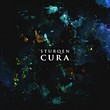|
|

Sturqen Yet again Kvitnu presents another document form their series of music from 'the brightest side of the darkest sound'. Sturqen has released a line of albums and EPs over the years (as CDs, cassettes or on vinyl - for labels like Kvitnu, as well as for Ordinária, Third Type Tapes, Metaphysik, and Silvox Recordings), with titles like Peste (EP) and Colera (EP). This time they have found the cure (Cura) for everything. Cura (cure in English) is an album that suggests 'treatment, remedy, the process of restoration of a sick organism, an unbalanced being. If a recovery process exists, the question then lies in discovering the problem, the treatment for which may be found in searching for a balance that controls the interior of the organism or in the regulating processes that bring order to an installed chaos.' Kvitnu (or Sturqen) goes further, saying: 'Cura is a negation of such a problem; a negation of the negation that suppresses that which is strange to a healthy system. Cura is an act of healthy violence.' Sturqen is a Portuguese duo counting experimental noisemakers César Rodrigues and David Arantes. Last time we checked in on the rough tech-outfit was for their album Praga (2011). Since then they've launched the self-released Raia (2012) and Neophobia (Kvitnu, 2013), making Cura their fifth (?) album. Cura is 52-minute-long, powerful and intricate punch to the head and stomach, where Sturqen's 'sonority explores this violence, where the sound lives off such hardness that attracts because it is ugly, raw and often unpredictable.' They (or Kvitnu) tag their music as 'strong, experimental IDM-noise of the technoid/technoir/technoise type', meaning this whirling instrumental adventure is a rough experience - but not without melodic patterns. The labyrinth works of Sturqen pass through grimy, dirty passages, like walking through a dark and dusty factory basement with mystic, industrial debris lying all over the floor. Slight panic and discomfort strike you when you wander through their path, but the surprises are indeed present and highly evident. A track such as "Fobos" is not phobic at all, but more like something teasing and exciting deep inside their dark and gloomy world. Alternatively, maybe it is an outer world, as I sometimes sense that this is some satellite expedition to a far off planet or a different, parallel solar system - as you find with the track "Systema". There are several cool and pulsating and/or monotonous and low-flowing, intense and relaxed tracks here, such as "Kivi", "Passaros" (Birds?), "Ptomaina", and "Medusa". The latter might be a slow and calm, threatening horror story as Medusa (in Greek mythology) was 'a monster, a Gorgon [a dreadful female creature], generally described as a winged human female with a hideous face and living venomous snakes in place of hair.' (Wikipedia) "Navegador" (Navigator?) brings my mind (again) off to some interstellar space traveling, or maybe this is just about being lost out there in the middle of the biggest blackest ocean at night... Then again (speaking of exit and/or enter planet Earth) the final track "Asteroide" quite obviously is shifting throughout or between minor planets somewhere out there, somewhere either if it's in the Inner or Outer Solar System. Anyway, Sturqen come in peace with this album, which is quite a calm collection of sounds and rhythms. Cura is cure for pain, or maybe pain for cure. Maybe it is the final cure... for man, for humankind, or for earth itself. Like Kvitnu/Sturqen state: 'The music could be both the mystery or the definitive answer.' Copyright © 2016 H. Oppøyen
|
| You may also want to check out our Sturqen article/review: Praga. |
| © 2016 Luna Kafé |